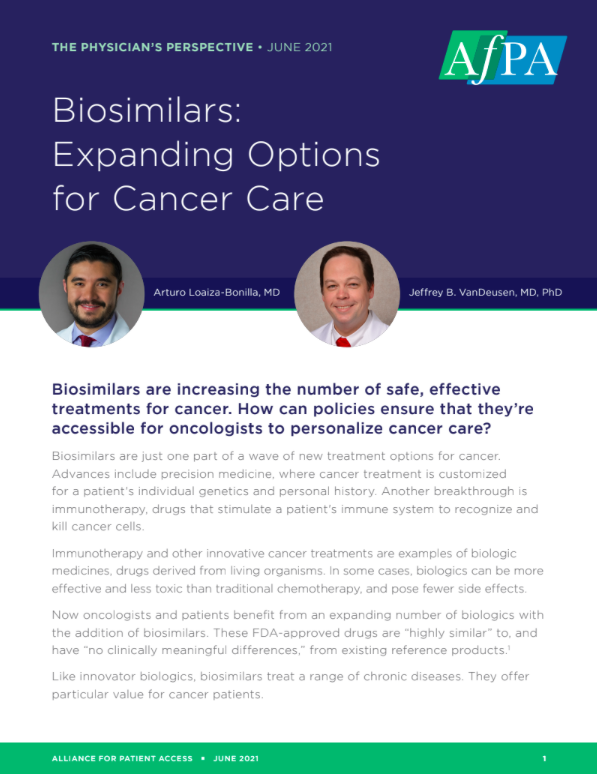Biosimilars offer more cancer treatment options at potentially lower prices. So why aren’t they more accessible?
Oncologists Arturo Loaiza-Bonilla, MD, and Jeffrey B. VanDeusen, MD, PhD, weigh in on the matter in a new policy brief from the Alliance for Patient Access.
Biosimilars, which are follow-on versions of originator biologics, are created from living systems. Biologics, including biosimilars, are typically injected or infused to treat conditions such as arthritis, high cholesterol, migraine or cancer.
Benefits of Biosimilars
Biosimilars stand to benefit both physicians and cancer patients in several ways, the paper explains.
- Increasing treatment options. More treatments mean more opportunities to tailor care.
- Lowering costs. Biosimilars often come at a lower price than innovator products.
- Offering alternatives. If a patient experiences side effects with a biologic, biosimilars may offer a timely substitute.
- Filling logistical gaps. In the case of shortages or supply chain disruptions, as observed during the COVID-19 pandemic, patients can continue treatment without interruption.
Not all these benefits are readily available, however.
Boosting Physician Confidence
Initially, questions about the equal efficacy and rigor of clinical trials for biosimilars slowed uptake. “Oncologists are natural skeptics,” Drs. Loaiza-Bonilla and VanDeusen acknowledge.
Confusion can also complicate matters. Time-strapped oncologists may struggle to keep track of new biosimilars, including which biologic innovator product they are connected to, which studies led to which approvals and in which cases the biosimilars’ approved uses vary.
But physicians’ confidence level is rising, the authors note, as they gain more experience using biosimilars with their patients. Robust data can also increase physicians’ comfort with biosimilars. Thus, the paper argues, physicians need a steady stream of real-world data as it becomes available.
More Options, More Health Plan Interference
Having more treatments options, however, doesn’t necessarily mean having your choice of treatment.
Health plans typically select their preferred drug and give it priority coverage, the paper notes. They may also change their preferred drugs periodically, or revise their formulary of approved drugs to exclude certain medications. These changes can result in non-medical switching, where patients must switch drugs or pay more out of pocket to stay on their current treatment.
Physicians and patients who want to challenge the switch must fill out insurance forms, send appeal letters and make calls to the health plan. Not all clinics have the manpower to do so.
On the issue of treatment decisions, the authors are clear. “The best care,” the physicians affirm, “stems from shared decision-making between a patient and a trusted clinician.”
To learn more, read “Biosimilars: Expanding Options for Cancer Care.”


